Submitted by Antonello Magliozzi
A new awareness for a better normal
Italy Architecture News - May 20, 2020 - 21:46 5552 views

The curve of world pandemic infections is still growing, the crisis is not over yet, but a recovery of normality is already underway in order to avoid further economic disasters. While in many countries there is a gradual restart of activities in different conditions, efforts are also being made to address the post-Covid-19 future in a long-term vision. The most optimistic argue that everything will proceed differently and that there will be a new way of living and looking at the world. After such a negative event as that of the pandemic, many think that in the future we will only act in a better way, we will have a new awareness for a better normalcy. That awareness that highlights how important it is to prevent problems according to the indications of science, as is also remembered by the nature of the world.
But what really happens today? Certainly solutions are being sought to defeat the virus that affects the population and that destroys world economies. Certainly the community is focused on this topic because it concerns an immediate, though global, problem. However, it seems that problems that do not immediately affect people's daily safety, the more complex ones related to our ecosystem such as climate change and man-made pollution, have nowadays passed to a second level of political interest. Since these are effectively interconnected with human health itself and concern the only existing vital system: that of the nature of the world, they cannot be postponed anyway. In order not to forget it, it is therefore necessary to raise again the level of attention and explain even more their importance.
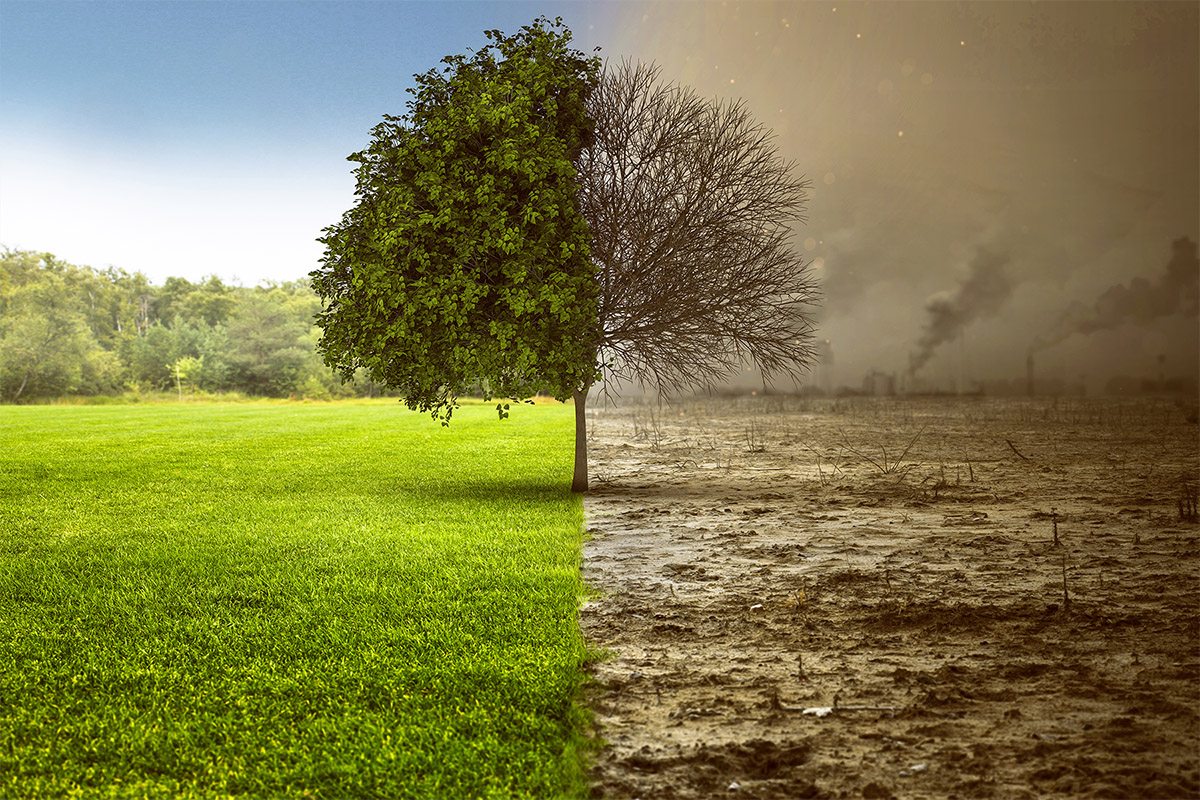
Image © Pacinimedicina
The World Health Organization recalls that air pollution causes the death of around 4.2 million people worldwide every year. Many more than Covid-19 has produced since the start of the pandemic spread. The deaths are concentrated in the most industrialized and urbanized areas, where the emissions of polluting gases and fine dust are greater and affect more significant quantities of population. In the same areas where the major outbreaks of Covid-19 are also concentrated. It is in fact likely that there is a certain causal relationship between pollution, spread and mortality from coronavirus. This appears to be demonstrated by several statistical models, as well as by a preliminary study conducted by a group of researchers from the University of Harvard (United States), which states that an increase of one microgram of PM2.5 per cubic meter of air can result in an increase 15 percent of Covid-19 deaths.
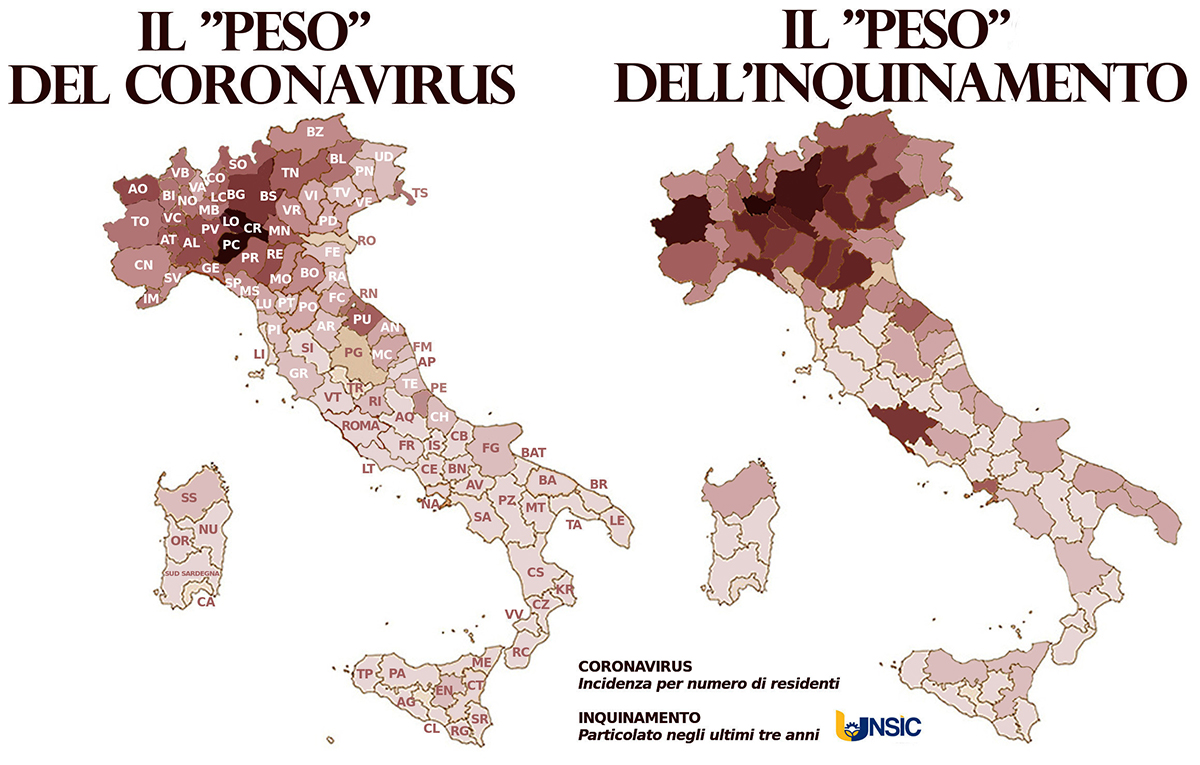
Covid diffusion map and Italy pollution map. Image © UNSIC
On the same topic, a study conducted in Italy by UNSIC highlighted in two maps "the weight of the coronavirus" compared to the "weight of pollution" in different Italian provinces. The Two maps comparison reveals fairly clear overlaps of the factors analyzed both in the Pianura Padana and in the northern area of the Marche. A study that does not allow to consider that the virus has spread exclusively due to pollution, but which shows as the greatest number of victims is favored by the presence of pollution.
If pollution can promote the lethal response of pandemics, it is also true that COVID-19 has shown how a strong reduction in production activities, with a widespread lock down aimed at the reduction of infections, has also reduced pollution. A phenomenon that could appear as a conservative reaction of nature itself, as an unconscious attempt at self-healing to cope with the planet systemic crisis of the 21st century. In fact, neither the first and second world wars, nor the Spanish plague, caused a drop in carbon dioxide emissions like the pandemic we are suffering from.
Pollution in the time of Covid-19 via youtube.com © ASI
Covid-19, according to the surveys and forecasts of the IEA, the International Energy Agency, has indeed provoked the largest reduction of CO2 in history. A trend also shown by the satellite observations of the last weeks made by Copernicus, the initiative of the European Space Agency to monitor the atmosphere. In particular, from January to 11 March, emissions of nitrogen dioxide (NO2) - one of the main polluting gases, which favors asthma and other lung problems - have significantly decreased in Europe and especially in Northern Italy. In this area, one of the most polluted on the continent, pollution has decreased by 10 percent since mid-February mainly due to the reduction in vehicle travel.
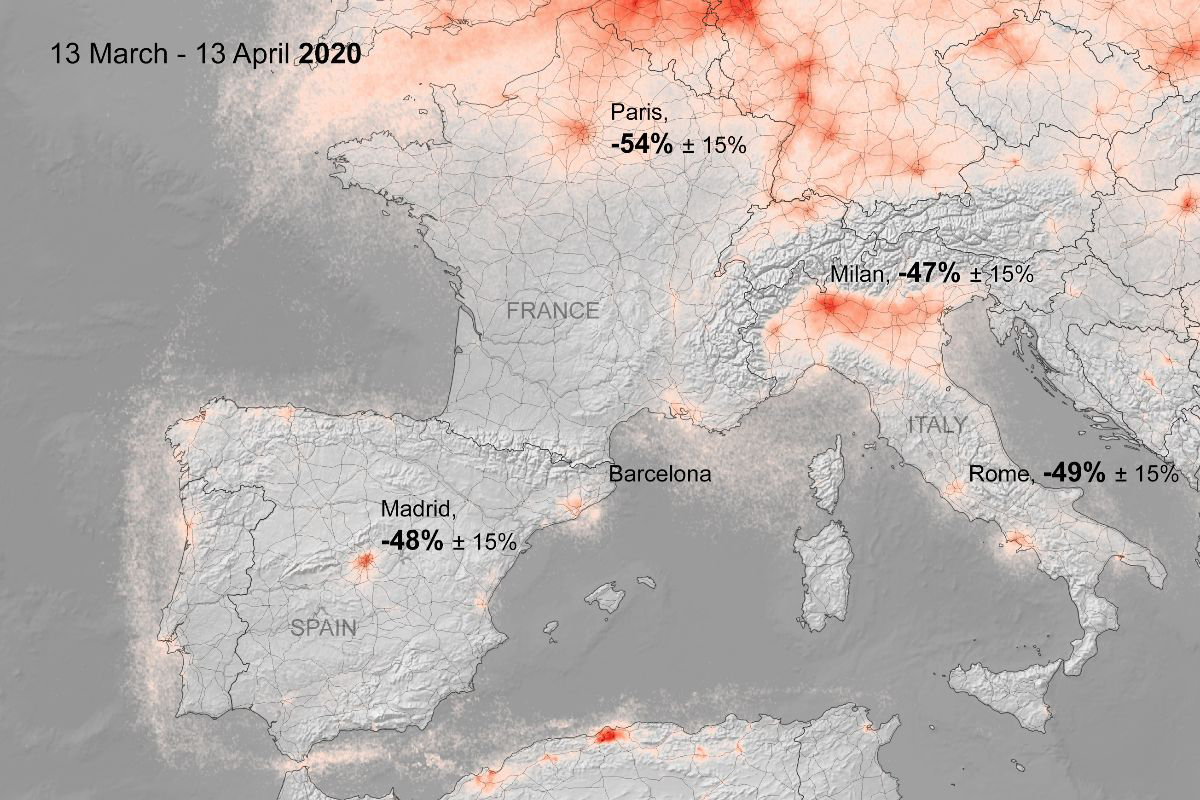
Pollution reduction rates in the period 13 March - 13 April 2020. Image © ESA
The analysis of the pollution reduction data, together with the evaluation of the production activities' interruption, it is far from being positive. It is for the impact that the economic recession itself generates on populations and markets, but also for the automatisms that will regulate the reactivation of production activities, if no change will occur. At this regard, Fatih Birol clearly warns that if the economy recovers quickly as everyone hopes, we will soon see a "rebound effect", as happened after the 2008 financial crisis, with an increase in general pollution levels. A scenario that sees a return to an old normal of "business as usual", with an increase in climate problems and without even the improvements that could derive from the covid-19 lesson learned.
The effects of the pandemic should instead highlight that "global warming is not a crisis, it is an irreversible transformation" and that "there is no vaccine against climate change". For a "best normality" in the next future, as observed by the IPCC member François Gemenne, "structural measures will have to be adopted, which will impose a true transformation of society and the economy". In fact, containment measures such as those adopted for the pandemic cannot be an example to solve climate problems, but can only highlight the impact we have on nature, so as to strongly urge new behaviors and decisions.
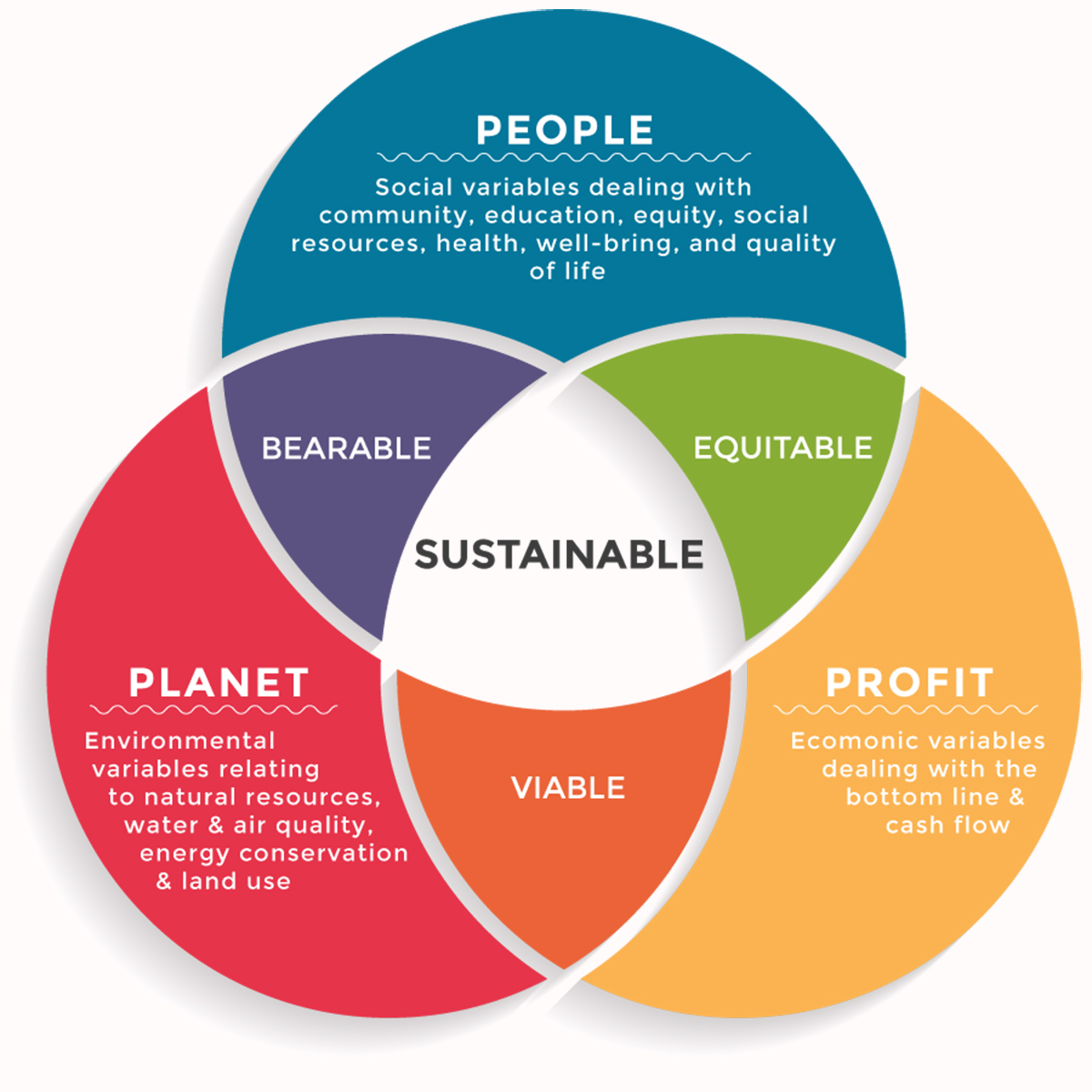
Triple Bottom Line: People-Planet-Profit. Image © Medium.com
To drive future development in a way that adequately balances the aggregation of social, economic and environmental models, everyone's efforts at any level will be needed. The correct application of the "triple bottom line" strategies will really require a great commitment in the political choices, but also a conscious and active effort by the population itself. Just as it happened during the pandemic with physical distancing in order to reduce infections, today everyone is called to collaborate responsibly. To reduce CO2 emissions, for instance, daily trips can be reduced with smart-working modalities and policies. Many policies already in place as best practices could moreover be widely implemented in order to prevent, even before treating, irreversible damage to the planet. Policies such as those that already promote the consumption of local products, those that reduce waste production the most, those that promote "green travel" with nearby and eco-sustainable destinations, or those that maximize the use of electric cars and the expansion of green mobility. Last but not least, those that most encourage green architecture and sustainable production throughout whole buildings' life cycle.
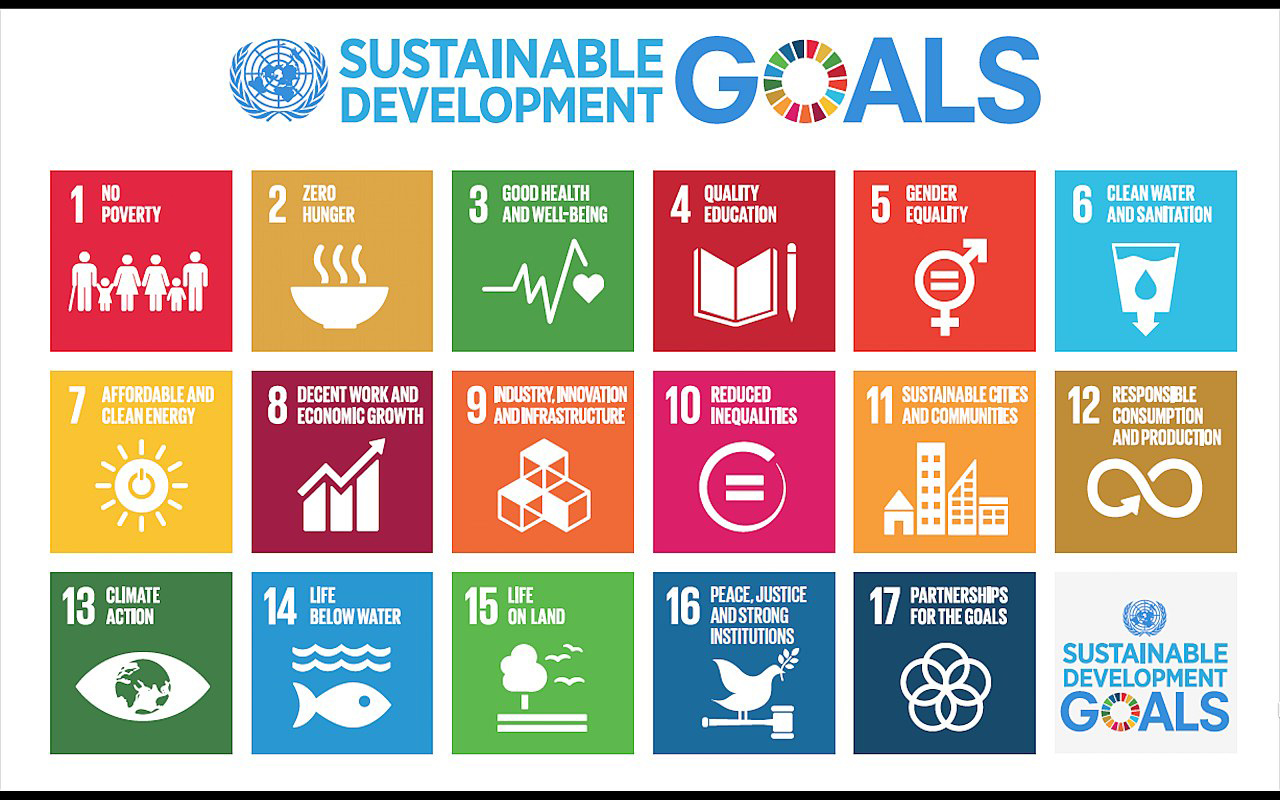
Sustainable development goals Image © SDG Poster
The "reconstruction" in the post-pandemic economy could therefore mainly involve our cities, which in reality could be further regenerated through new remediation, recovery and sustainable re-functionalization programs. In this way, the positive effects of these choices would certainly generate a cleaner planet, with a healthier population and a renewed global economy, along with a more resilient world to deal with future emergencies such as those of pandemics themselves. If this happened right from today, it would be possible to say the COVID-19 pandemic has indeed contributed in creating a new collective consciousness for a better normality. It would be possible also to say it has triggered an acceleration of the fourth industrial revolution for a global better maturity.
This is not science fiction vision of our future as most skeptics might think. This view is really true especially now, just when there is the greatest attention to global health problems, precisely when there is also the best fertile ground for promoting shared plans for a healthier future. Action plans such as the one that Marco Cappato is promoting these days to stop climate change on an international level: stop global warming campaign. An institutional initiative to collect signatures to ask Europe to stop climate change by shifting taxes from work to CO2. An idea supported by 27 Nobel laureates and over 5,000 scientists and which requires the commitment of institutions and citizens. The target is one million signatures by July 20, 2020 in at least 7 European Union countries. A goal which manifests the need for a strong renewal and which, if achieved, would facilitate the transformation path towards "zero emissions" for the concrete construction of a "better normal". And, what do we really need now to achieve it? We must not just talk about it, we must act with the utmost commitment every day, together and united globally.
Stop Climate change Campagne via youtube © www.stopglobalwarming.eu
Top image courtesy of Miroslava Chrienova | Pixabay
